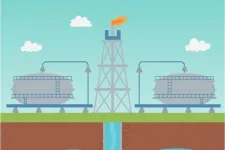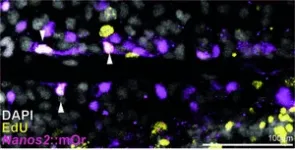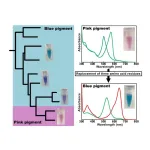(Press-News.org) BINGHAMTON, N.Y. -- Energy companies use persistent and personalized pressure to get landowners to give permission for hydraulic fracturing (fracking), and even when landowners decline, companies use legalized compulsion to conduct fracking anyway, according to a new study led by researchers at Binghamton University, State University of New York and UNLV.
“Hydraulic fracturing is a controversial issue, but a lot of the controversy has been focused on the big-picture consequences, for the climate and the economy,” said Benjamin Farrer, lead author and former PhD student at Binghamton University. “One of our hopes for this paper is that it will encourage policymakers to pay more attention to the individual experiences of the people who are closest to the issue.”
Because many fossil field reservoirs in the United States lie under private land, energy companies often have to negotiate with private landowners, offering compensation in exchange for access to the minerals under their land. Since a well is only economically viable if you can drain a large spatial area from a single well, drilling companies have to pool multiple mineral claims into a single working contract before drilling. But landowners often hold out from such deals for various reasons – they might be wary of the potential health risks, holding out for more money, or they simply might be unreachable.
This is where compulsory unitization comes in. It’s a law that many oil- and gas-producing states have in which if some percentage of the land on top of an oil/gas reservoir is owned by people who have already given permission for drilling, then the owners of the remaining land can be compelled to join the drilling. For example, if there are 1,000 acres of land on top of a gas deposit, and the owners of 650 acres have given permission, the owners of the remaining 350 acres of land can be compelled to join.
“Under conventional vertical drilling, the use of compulsion generally was a net positive for mineral owners – it prevented holdouts looking for better contract terms from tanking a project and it allowed small properties or properties along the border of a drilling area to force themselves into a contract if the drilling company tried to shut them out,” said Robert Holahan, associate professor of political science at Binghamton University. “Under fracking, though, where the drilling happens horizontally under multiple properties, compulsory unitization can force mineral owners who otherwise don't want to lease their property to do so.”
A research team including Holahan, Farrer, and former Binghamton students Kellyanne Allen and Tara Riggs examined data from Ohio, a state that saw a boom in fracking in the 2010s. The team obtained the full online database from Ohio’s Department of Natural Resources, which covered every compulsory unitization application submitted in Ohio from January 2014 to April 2021, during the height of the fracking boom. The team reviewed a random sample of 37 applications, each of which included a log of every time a landowner was contacted about leasing, including the date, method and result of the conversation.
In one example, a landowner is opposed to signing a lease, but the company persists in its attempts to obtain her signature. The landman calls, sends letters and when those are returned with “REFUSED” hand-written across them, the landman drives to the landowner’s house. When the landowner refuses to answer the door, the landman speaks with her neighbors and family.
In another example, a landman contacts a landowner undergoing radiation treatment at a hospital. The landowner seems willing to sign but wishes to get home from the hospital before discussing it. However, the landman continues to contact them while they’re at the hospital for weeks.
“Overall, we find widespread use of personalized tactics like phone calls and visits, as well as evidence that these tactics are used persistently, as landmen make multiple attempts over multiple months to contact landowners. We also find that many negotiations end in compulsion rather than in consent,” wrote the researchers.
The evidence also suggests that compulsory unitization is being used in negotiations with many different types of landowners, rather than just with economic holdouts and unreachable landowners.
“Legal instruments, like compulsory unitization or pooling, are often designed to solve one type of problem (ensuring all mineral owners get a fair share of revenues from an oil or gas well), but eventually can be used for other purposes (forcing mineral owners to lease their rights),” said Holahan. “Effective resource policy requires a continuous updating of the law as technologies change.”
The researchers are conducting a follow-up survey with individuals whose conversation records were used in the paper to verify their accuracy. In addition, Holahan and his team conducted a survey of 3,000 people in the Twin Tiers of New York and Pennsylvania to assess opinions on drilling and wind turbines to better understand how, or if, 'green energy' is viewed differently from 'conventional energy' at the scale of property owners.
The paper, “Assessing How Energy Companies Negotiate With 31 Landowners When Obtaining Land for Hydraulic Fracturing,” was published in Nature Energy.
END
Energy companies pressure landowners into fracking, study shows
Landmen use repeated phone calls, home visits and ‘legalized compulsion’ to force homeowners to give up their land
2024-08-19
ELSE PRESS RELEASES FROM THIS DATE:
UC Irvine team says urban street networks, building density shape severity of floods
2024-08-19
Irvine, Calif., Aug. 19, 2024 — Cities around the globe are experiencing increased flooding due to the compounding effects of stronger storms in a warming climate and urban growth. New research from the University of California, Irvine suggests that urban form, specifically the building density and street network of a neighborhood, is also affecting the intensity of flooding.
For a paper published today in Nature Communications, researchers in UC Irvine’s Department of Civil and Environmental Engineering turned to statistical mechanics ...
Nurses play key role in addressing mental well-being for people after a stroke
2024-08-19
Statement Highlights:
The latest research indicates that 16% to 85% of people recovering from a stroke experience at least one psychosocial symptom, including depression, anxiety, stress, fatigue and/or decreased quality of life.
Critical nursing interventions, such as regular mental health screenings, education, symptom management and follow-up care, are key to reducing the negative effects on a patient’s mental well-being after a stroke, yet only a small proportion of patients receive treatment. ...
Why these educators believe whole-class reading creates a sense of community in the classroom
2024-08-19
With teaching methods for reading and writing under constant scrutiny, and high-stakes testing creating intense pressure to teach strictly to state standards, is there still value in whole-class reading?
Two educators believe that whole-class reading should go hand-in-hand with individual instructional reading, and they say it is vital for cultivating a sense of classroom community while developing critical thinking in young minds.
Educators Lynsey Burkins and Franki Sibberson, both teachers and educators from Ohio, have published a book called In Community ...
Researchers develop an instant version of trendy, golden turmeric milk
2024-08-18
DENVER, Aug. 18, 2024 — If you’ve visited a trendy café in the past few years, you might have noticed “golden” turmeric milk on the menu. Though recently advertised as a caffeine-free, healthy coffee alternative, the drink is a fancified version of haldi doodh — a traditional Indian beverage often used as an at-home cold remedy. And now, researchers have developed an efficient method to make a plant-based, instant version that maintains the beneficial properties of the ingredients while also extending its shelf life.
The researchers will present their results at the fall meeting of the American Chemical Society (ACS). ...
Peering into the mind of artificial intelligence to make better antibiotics
2024-08-18
DENVER, Aug. 18, 2024 — Artificial intelligence (AI) has exploded in popularity. It powers models that help us drive vehicles, proofread emails and even design new molecules for medications. But just like a human, it’s hard to read AI’s mind. Explainable AI (XAI), a subset of the technology, could help us do just that by justifying a model’s decisions. And now, researchers are using XAI to not only scrutinize predictive AI models more closely, but also to peer deeper into the field of chemistry.
The researchers will present ...
Evidence stacks up for poisonous books containing toxic dyes
2024-08-18
DENVER, Aug. 18, 2024 — If you come across brightly colored, cloth-bound books from the Victorian era, you might want to handle them gently, or even steer clear altogether. Some of their attractive hues come from dyes that could pose a health risk to readers, collectors or librarians. The latest research on these poisonous books used three techniques — including one that hasn’t previously been applied to books — to assess dangerous dyes in a university collection and found some volumes may be unsafe to handle.
The researchers will present their results at the fall meeting of the American Chemical Society (ACS). ACS Fall 2024 is a hybrid meeting being ...
Novel photoreceptor sheds light on how cyanobacteria see color
2024-08-17
Tokyo, Japan – Scientists from Tokyo Metropolitan University have identified a new photoreceptor in cyanobacteria with a modification in part of its structure which makes it sensitive to green/teal light. The photoreceptor belongs in a family usually sensitive to red/green light in the environment. They identified the parts of its amino acid structure responsible for this behavior; editing them helped restore sensitivity to red and green light, a remarkable example of molecular “plasticity” in action.
Cyanobacteria, also known as blue-green algae, are phenomenally important players ...
The bee’s knees: New tests created to find fake honey
2024-08-17
Researchers led by Cranfield University have developed new ways to detect sugar syrup adulteration in honey, paving the way for fast and accurate tests to discover fake products.
There is growing consumer demand for honey, with £89.8 million worth of honey imported to the UK in 2023. But as a high-value product it is vulnerable to fraud, with syrups added to dilute the pure honey – a report from the European Commission in 2023 found 46% of 147 honey samples tested were likely to have been adulterated with cheap plant syrups.
Because honey’s characteristics vary due to sources of nectar, season of harvest and ...
Sustainably reducing inappropriate IV use by more than a third
2024-08-17
Sustainably reducing inappropriate IV use by more than a third
Reasearch led by Amsterdam UMC, across more than 5 years and 1100 patients has demonstrated a strategy for reducing inappropriate IV use by a third, an effect that was sustained across the five-year period. This should also lead to reduction in the associated infections that effect one in ten patients. These results are published today in The Lancet eClinicalMedicine.
"Infections caused by both IVs and catheters occur in more than 10% of patients and studies indicate that up to a quarter are not necessary. Simply, this means that patients are placed at ...
UAF scientists discover phenomenon impacting Earth’s radiation belts
2024-08-16
Two University of Alaska Fairbanks scientists have discovered a new type of “whistler,” an electromagnetic wave that carries a substantial amount of lightning energy to the Earth’s magnetosphere.
The research is published today in Science Advances.
Vikas Sonwalkar, a professor emeritus, and Amani Reddy, an assistant professor, discovered the new type of wave. The wave carries lightning energy, which enters the ionosphere at low latitudes, to the magnetosphere. The energy is reflected upward by the ionosphere’s ...
LAST 30 PRESS RELEASES:
Natural selection operates on multiple levels, comprehensive review of scientific studies shows
Developing a national research program on liquid metals for fusion
AI-powered ECG could help guide lifelong heart monitoring for patients with repaired tetralogy of fallot
Global shark bites return to average in 2025, with a smaller proportion in the United States
Millions are unaware of heart risks that don’t start in the heart
What freezing plants in blocks of ice can tell us about the future of Svalbard’s plant communities
A new vascularized tissueoid-on-a-chip model for liver regeneration and transplant rejection
Augmented reality menus may help restaurants attract more customers, improve brand perceptions
Power grids to epidemics: study shows small patterns trigger systemic failures
Computational insights into the interactions of andrographolide derivative SRJ09 with histone deacetylase for the management of beta thalassemia
A genetic brake that forms our muscles
CHEST announces first class of certified critical care advanced practice providers awarded CCAPP Designation
Jeonbuk National University researchers develop an innovative prussian-blue based electrode for effective and efficient cesium removal
Self-organization of cell-sized chiral rotating actin rings driven by a chiral myosin
Report: US history polarizes generations, but has potential to unite
Tiny bubbles, big breakthrough: Cracking cancer’s “fortress”
A biological material that becomes stronger when wet could replace plastics
Glacial feast: Seals caught closer to glaciers had fuller stomachs
Get the picture? High-tech, low-cost lens focuses on global consumer markets
Antimicrobial resistance in foodborne bacteria remains a public health concern in Europe
Safer batteries for storing energy at massive scale
How can you rescue a “kidnapped” robot? A new AI system helps the robot regain its sense of location in dynamic, ever-changing environments
Brainwaves of mothers and children synchronize when playing together – even in an acquired language
A holiday to better recovery
Cal Poly’s fifth Climate Solutions Now conference to take place Feb. 23-27
Mask-wearing during COVID-19 linked to reduced air pollution–triggered heart attack risk in Japan
Achieving cross-coupling reactions of fatty amide reduction radicals via iridium-photorelay catalysis and other strategies
Shorter may be sweeter: Study finds 15-second health ads can curb junk food cravings
Family relationships identified in Stone Age graves on Gotland
Effectiveness of exercise to ease osteoarthritis symptoms likely minimal and transient
[Press-News.org] Energy companies pressure landowners into fracking, study showsLandmen use repeated phone calls, home visits and ‘legalized compulsion’ to force homeowners to give up their land






